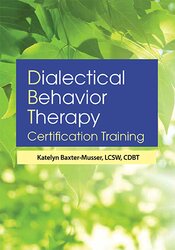

Dialectical Behavior Therapy is a powerful, evidence-based treatment that allows clinicians to provide positive outcomes for clients of all ages struggling with stress, depression, trauma, suicidal and self-destructive behaviors, and a variety of other clinical presentations.
This Certification Training will build the core competencies you need to bring DBT into your clinical practice and effectively use it with a wide range of client types. You’ll be given a roadmap to treat individuals using the skills and techniques from DBT so you can help your most challenging clients reach new levels of healing.
Even if you’ve taken other Dialectical Behavior Therapy (DBT) trainings, this program will increase your competency and clinical sophistication with DBT when working with adults, youth, substance users, and trauma survivors in a wide variety of settings.
Best of all, upon completion of this training, you’ll be eligible to become Certified in Dialectical Behavior Therapy (C-DBT) through Evergreen Certifications. Certification lets colleagues, employers, and clients know that you’ve invested the extra time and effort necessary to understand the complexities of using DBT in counselling. Professional standards apply. Visit for details.
Purchase today and get the skills and confidence you need to successfully help your clients with the power of DBT!
CERTIFICATION MADE SIMPLE!
Attendees will receive documentation of C-DBT designation from Evergreen Certifications 4 to 6 weeks following completion.
*Professional standards apply. Visit for professional requirements.
Planning Committee Disclosure - No relevant relationships
All members of the 小蝌蚪视频. planning committee have provided disclosures of financial relationships with ineligible organizations and any relevant non-financial relationships prior to planning content for this activity. None of the committee members had relevant financial relationships with ineligible companies or other potentially biasing relationships to disclose to learners. For speaker disclosures, please see the faculty biography.
Continuing education credit information is coming soon for this non-interactive self-study package.
CE hours may be available for select professions, as listed in the target audience. Hours will be dependent on the actual recording time. Please check with your state licensing board or organization for specific requirements.
There may be an additional fee for CE certificates. Please contact our Customer Service at 1-800-844-8260 for more details.
**Materials that are included in this course may include interventions and modalities that are beyond the authorized practice of your profession. As a licensed professional, you are responsible for reviewing the scope of practice, including activities that are defined in law as beyond the boundaries of practice in accordance with and in compliance with your professions standards.

Katelyn Baxter-Musser, LCSW, CDBT, is a licensed clinical social worker and is certified in Dialectical Behavior Therapy (CDBT) through Evergreen Certifications Institute.
Ms. Baxter-Musser is trained in DBT and incorporates it into her practice in working with adolescents and adults presenting with a variety of concerns. She has facilitated DBT skill groups and has used DBT in individual therapy in private practice and in work for several agencies. Her years of experience using DBT principles in her practice have helped her clients to develop healthier coping skills, better process their past traumas, and increase their ability to identify and cope with destructive emotions.
Ms. Baxter-Musser is also trained in Cognitive Behavioral Therapy is a certified EMDR therapist. She is a member of the National Association of Social Workers, the American Academy of Experts in Traumatic Stress, the National Center for Crisis Management and the Maine Collaborative Law Alliance. She sits on the EMDRIA Standards and Training Committee and is the co-regional coordinator for the EMDRIA Southern Maine Regional Network. She works in private practice where her areas of expertise include the treatment of trauma, PTSD, depression, anxiety grief and relationship issues.
Speaker Disclosures:
Financial: Katelyn Baxter-Musser, LCSW, CDBT, CPD, is the Owner, Operator and Trainer at Inner Awakening Counseling & Consulting and receives a speaking honorarium from 小蝌蚪视频. She has no relevant financial relationships with ineligible organizations.
Non-Financial: Katelyn Baxter-Musser, LCSW, CDBT, CPD, is a member of the EMDRIA Standards and Training Committee, the Southern Maine EMDR Collation, the National Association of Social Workers, the American Academy of Experts in Traumatic Stress, and the National Center for Crisis Management.
|
3-Day Dialectical Behavior Therapy Certification Training
Copyright: 01/29/2025 - Product Code POS055335 |
Access never expires for this product.
Visit our FAQ page at www.pesi.com/faq or contact us at
DBT Skills Training
Mindfulness: Cultivate the Skills at the Core of Successful DBT Therapy
Interpersonal Effectiveness: Skills to Build Better Relationships and Lives
Emotion Regulation: Practical Skills for Healthier Emotions and Greater Resilience
Distress Tolerance: Skills to Cope with Painful Moments and Survive Crisis
| 5 |
|
| 4 |
|
| 3 |
|
| 2 |
|
| 1 |
|
Satisfaction Guarantee
Your satisfaction is our goal and our guarantee. Concerns should be addressed to: PO Box 1000, Eau Claire, WI 54702-1000 or call 1-800-844-8260.
ADA Needs
We would be happy to accommodate your ADA needs; please call our Customer Service Department for more information at 1-800-844-8260.
小蝌蚪视频 Mobile App
Access CE trainings on your phone or tablet through our free mobile app. Choose video or audio-only versions of online courses from the world’s best instructors, and complete your CE requirements anywhere, anytime, at your own pace.
Please wait ...